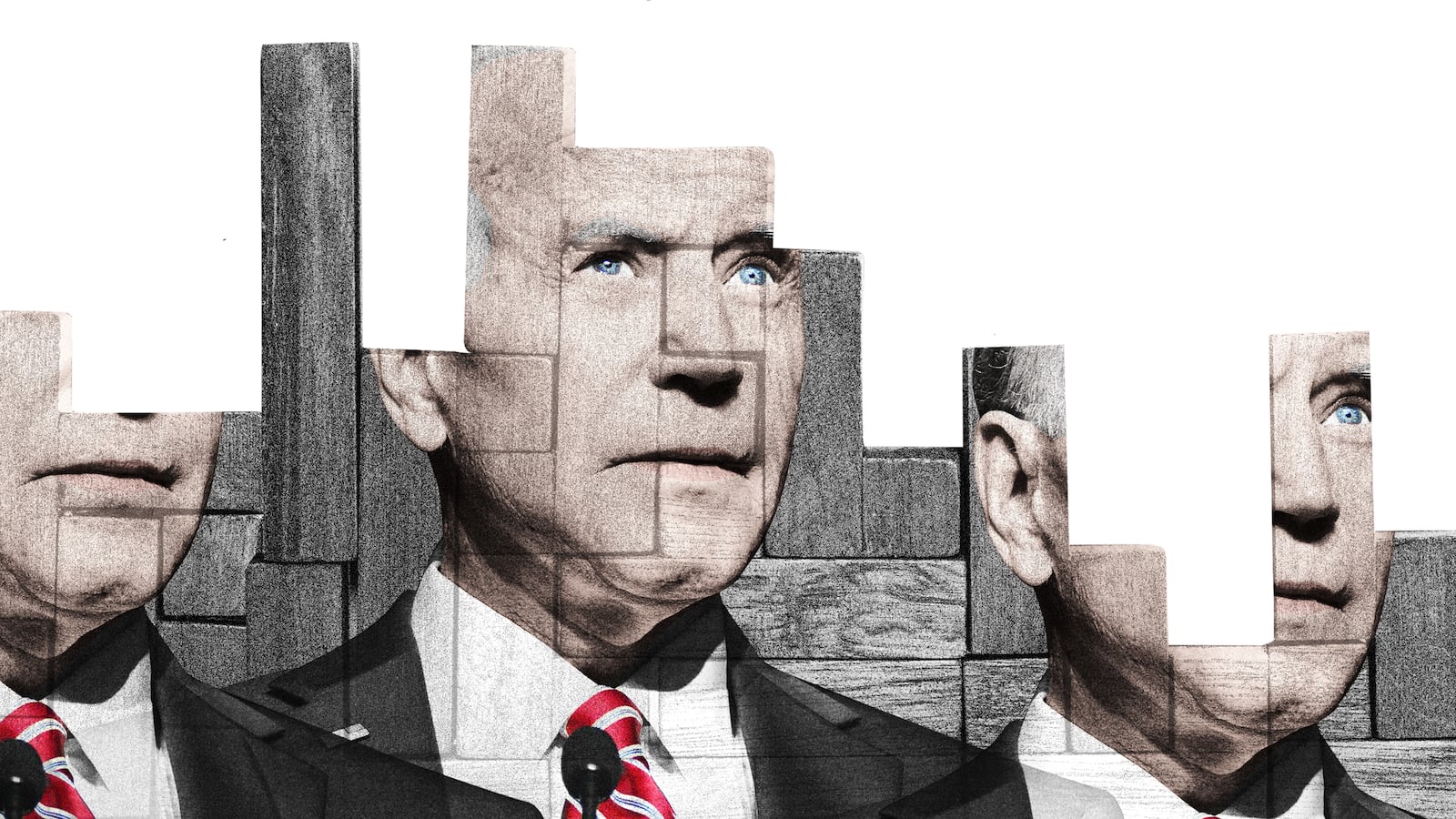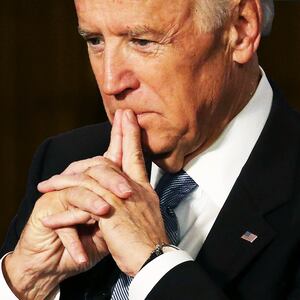To cast Joe Biden into the #MeToo wilderness before the first primary vote is cast would be to ignore not just the whole history of politics—whose practitioners have been hugging and kissing, and not only babies, for years—but also our own social mores.
We are all Bidens now. We greet people with a hug and a kiss, air or otherwise, at breakfast, lunch, and dinner. We double-kiss at cocktail, book, and birthday parties, kid and adult. We do so on the sidelines of soccer games and random encounters at the movies and grocery store, when we know the person well and when we’ve just met, and without a thought to whether the person likes it or not. Blame, or credit, cheap travel to France, or calling an ordinary dinner a dinner party, but whether you’re in L.A. or my small hometown in Pennsylvania, it’s now choosing not to embrace that creates an awkward moment, rather than the other other way around.
Touching is part of the the practice of politics since time immemorial. It's a contact sport, one that’s asexual, at least in public, and a staple of campaigning, with the exception, oddly, of our current president. There are many complaints of sexual misconduct against him but none from the campaign trail because he’s a wholesale politician, preferring huge rallies to the labor-intensive retail campaigning in coffee shops, living rooms, or even rope lines where human contact takes place.
Still, you think President Trump with his dark sexual past would avoid the former vice president’s troubles. But he can’t resist punching someone where there’s already a bruise. In the midst of a fundraiser Tuesday night, he waded in. “Welcome to the world, Joe. You having a good time, Joe?’” he asked. He made a lame joke about asking someone for a kiss and said, “I felt like Joe Biden.”
He should be so lucky to be like Biden rather than a president so bad at governing he says he’s shutting the border with Mexico and killing Obamacare one day only to have to retreat the next after his allies told him that both moves would be catastrophic.
For your traditional elected official and politicians who aren’t pop stars riding on name rec, take away meet-and-greets—with all the bear hugs, shoulder squeezes, and kisses those entail—and you might as well remove the rubber chicken, folding chairs, and patriotic music from the Lincoln Day Dinner in Iowa. People expect some gripping and grinning after they wait hours to get into a pancake breakfast in Concord, New Hampshire.
Photo-ops? Sure they’re a modified version of Twister—who knows where to put their hands except dangerously close to someone’s lower regions? A politician with a reputation as waspily proper as George Herbert Walker Bush had a reputation as an occasional David Cop-a-Feel. Still no pol wants to deny a voter his—or her—selfie.
Sen. Kirsten Gillibrand, who pronounced that “none of it is OK” rather than make distinctions among various levels of alleged sexual misconduct, led the ouster of Sen. Al Franken. She refused to wait for an investigation, although she shifted on that when it was her time in the barrel. After Politico exposed her office’s deeply inadequate inquiry into credible and eventually provable allegations of sexual misconduct by a man on her staff, she quickly held an adequate one and the aide was let go. As to Biden, she says, “voters will have to decide.”
How the Biden matter ends depends on whether we apply the old Gillibrand standard, or one of a maturing movement that can make distinctions among allegations, for instance between victims of sexual abuse and women made uncomfortable by routine, albeit unwelcome, moves that may be deeply unpleasant but aren’t sexual or violent and occur in public view.
Could we come to some kind of détente where we agree that what politicians have done in the past in the course of business is, for the most part, not #MeToo-level actionable while at the same time ushering in a new and overdue era where we can simply assert that something makes us uncomfortable, so please don’t do it? That wouldn’t just work in politics, but real life as well.
Biden has been in public life for decades, hugging and mugging for cameras in tens of thousands of two-minute and 10-second encounters. Some—approaching a half-dozen and counting—have been received badly. There’s also been a parade of women saying they welcomed his warmth and attention.
Wednesday, Biden put out a video saying he “gets it” and will respect the personal space of those he encounters going forward while his aides worked to quickly change the subject back to his long record of supporting women. He has a lot to be proud of, but his record also includes the infamous Clarence Thomas hearings, where the women whose understanding he seeks were understandably unsatisfied by his most recent half-baked attempt at an apology.
What kept him from treating Anita Hill like a full human being: a juvenile desire to be one of the boys, an unhealthy dose of bipartisanship, a failure of courage? He said he wished he could have done something, as if he weren’t the person in charge who could have. Having the buck stop at the Resolute Desk is a big part of being president.
Not every act that made a woman uncomfortable deserves shaming someone out of a presidential race. With men on notice now, the question is how to set an exacting and overdue standard going forward now that hand-shaking has gone the way of jello salad at dinner. My stab at it is hug no one who doesn’t hug you first. In the alternative, do as Speaker Nancy Pelosi advised and put out your hand at the end of a very straight arm and say you have a cold.
For extra protection at a dinner “party,” up that to the flu.








